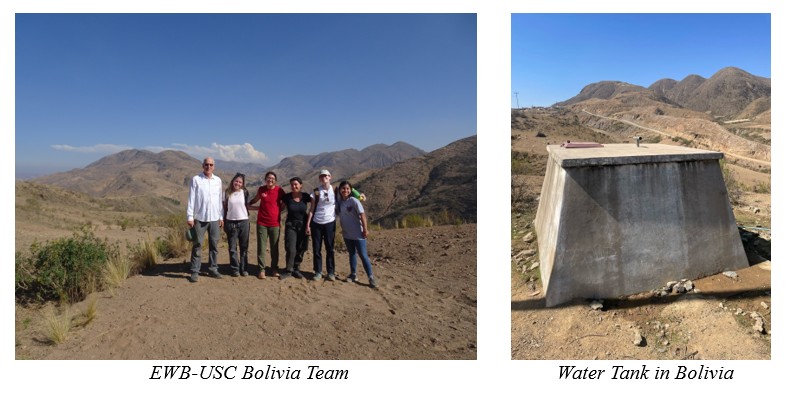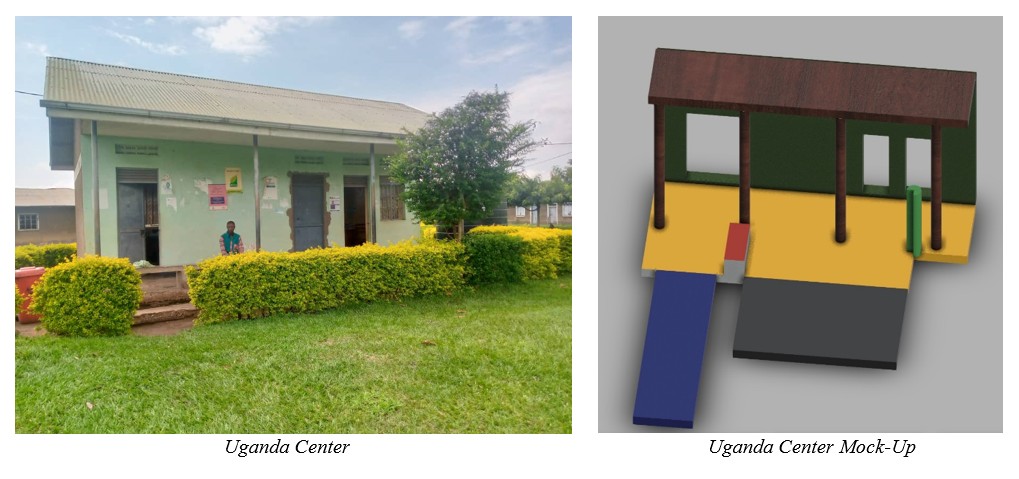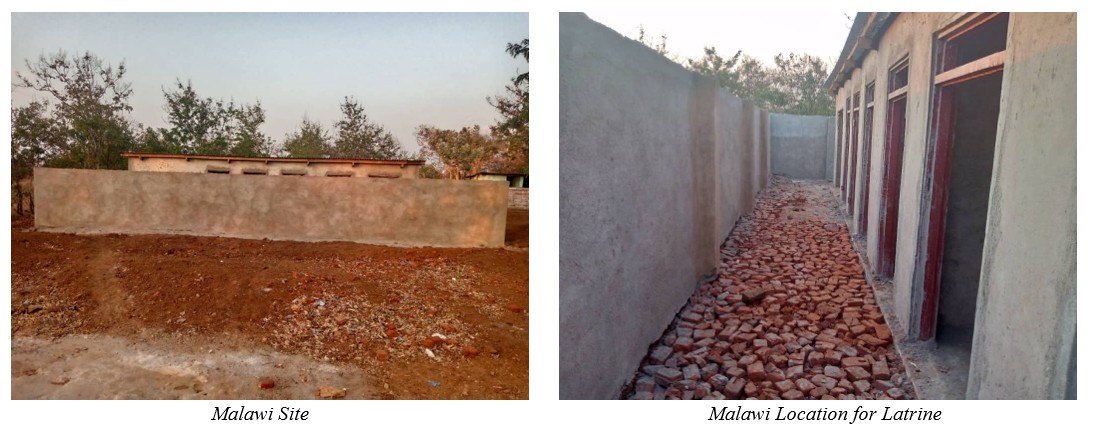Engineers Without Borders
Our Mission
USC Chapter Engineers Without Borders is raising funds to support ongoing engineering projects in Bolivia, Uganda, and Malawi. These projects empower communities to meet their basic human needs. We also equip future Trojan leaders to solve the world’s most pressing challenges.
With the support of USC alumni, parents, and friends, we are hoping to raise $5,000 to:
- 1. Yannani, Bolivia: We are improving clean water access by designing and implementing sustainable water distribution solutions for the community.
- 2. Ibuga, Uganda: We are enhancing infrastructure at the Ibuga Refugee Health Center where they can continue to provide medical care for displaced populations.
- 3. Chitala, Malawi: We are constructing a durable sanitation system to serve over 1,000 students at a local school and address recurring latrine failures caused by unstable soil conditions.
With the support of USC alumni, parents, and friends, we are hoping to raise $5,000 to:
- Send as many members of our team to these locations,
- Purchase supplies and materials needed for our projects, and
- Support other associated costs related to these projects and trips.
Our Projects
Bolivia
We’ve partnered with the Yanani community in Bolivia to improve water access for the village’s 180 residents. Yanani, a high-elevation village in the Chuquisaca region, suffers from a rudimentary and inefficient water system serving only 23 out of 77 families. Our project aims to provide clean, reliable water access by installing a gravity-fed water distribution system, filtration systems, and additional storage tanks. The USC EWB team, in collaboration with Engineers in Action (EIA), is overseeing the design, planning, and implementation phases of this community-driven project.

Uganda
Our Uganda Project aims to improve the infrastructure of the Ibuga Refugee Health Center, (established in the 1960s), a Health Center Level II in the Kasese District. Despite its crucial role in the community, the clinic faces significant infrastructure challenges, particularly during the rainy season when mud pathways limit access. In collaboration with local organizations, our team is committed to upgrading the driving and walking pathways and extending the existing water line to the Outpatient Department (OPD) and the newly constructed latrine. Funding for this project will facilitate the construction of these new pathways and water lines. These improvements will provide safe and reliable access for patients and staff, addressing immediate health concerns.
By enhancing the clinic’s infrastructure, patients can reach the clinic safely, such as during heavy rains with better pathways, and with improved water access, the clinic can offer higher-quality medical care with adequate sanitation facilities. This project will create lasting infrastructure improvements that will directly improve the community’s healthcare access and impact public health outcomes.
By enhancing the clinic’s infrastructure, patients can reach the clinic safely, such as during heavy rains with better pathways, and with improved water access, the clinic can offer higher-quality medical care with adequate sanitation facilities. This project will create lasting infrastructure improvements that will directly improve the community’s healthcare access and impact public health outcomes.

Malawi
This project addresses the urgent sanitation needs at the Chitala School, situated 10 kilometers south of Salima. With the existing system collapsing annually due to the region's soil and weather conditions, there's a pressing requirement for a robust, sustainable latrine system for the school's 1,010 students. Our team has designed an improved and secure latrine block that we have coordinated with our partner, Optimum Contractors, to build in Malawi.
The Chitala Latrine project will involve our team to work hard to clear the area and begin excavation work; lay a firm foundation for the structure; and erect a superstructure to form the main body of the latrine. Once the primary structure is in place, we can then begin installing internal and external finishes which will involve plasterwork, beautification tasks, replastering, pitching PVC, door fitting, landscaping, and painting.
By constructing a durable latrine block, we can provide students with a hygienic restroom facility that won’t collapse annually, ensuring long-term sanitation improvements for generations of students. Funding this project will allow our contractors to complete this work to finalize construction and ensure the Chitala School has a safe and sustainable sanitation system.
The Chitala Latrine project will involve our team to work hard to clear the area and begin excavation work; lay a firm foundation for the structure; and erect a superstructure to form the main body of the latrine. Once the primary structure is in place, we can then begin installing internal and external finishes which will involve plasterwork, beautification tasks, replastering, pitching PVC, door fitting, landscaping, and painting.
By constructing a durable latrine block, we can provide students with a hygienic restroom facility that won’t collapse annually, ensuring long-term sanitation improvements for generations of students. Funding this project will allow our contractors to complete this work to finalize construction and ensure the Chitala School has a safe and sustainable sanitation system.

Our Goal
Through this campaign, our goal is to raise $5,000 to help cover the many costs necessary to complete these projects. These costs include:
With your gift, you will be helping to make it financially possible for our members to be able to travel and implement these solutions that we have planned for the communities of Bolivia, Uganda, and Malawi. By donating today, you will help EWB-USC students to have an invaluable experience in their development as engineers, globally minded citizens, leaders, and humanitarians. Your support will also allow us to empower communities around the world while also empowering the next generation of leaders in engineering.
- Travel, lodging, and transportation expenses in Malawi and Bolivia for as many members of our team as we can bring on the trip.
- Costs for the purchasing of materials and supplies for our projects.
- Contractor fee for building.
If we are able to raise more funds, we can send more students and purchase additional supplies and materials to help with the projects and complete them much sooner!
With your gift, you will be helping to make it financially possible for our members to be able to travel and implement these solutions that we have planned for the communities of Bolivia, Uganda, and Malawi. By donating today, you will help EWB-USC students to have an invaluable experience in their development as engineers, globally minded citizens, leaders, and humanitarians. Your support will also allow us to empower communities around the world while also empowering the next generation of leaders in engineering.
.jpg)
For more information about USC's Engineers Without Borders, check us out at:
On Instagram: @ewb_usc
On LinkedIn: https://www.linkedin.com/company/ewbusc/
Facebook: https://www.facebook.com/ewbUSA.USC/
We may also be contacted directly via email at ewb@usc.edu
On Instagram: @ewb_usc
On LinkedIn: https://www.linkedin.com/company/ewbusc/
Facebook: https://www.facebook.com/ewbUSA.USC/
We may also be contacted directly via email at ewb@usc.edu
All RSOs are approved by the university and are student-run and student-led. RSOs are affiliated with the university but not part of the university. All RSOs operate with open membership and any currently enrolled USC student may join. RSOs also operate within the university’s non-discrimination policy:
Non-Discrimination Statement: This program is open to all eligible individuals. Engineers Without Borders operates all of its programs and activities consistent with the University’s Notice of Non-Discrimination. Eligibility is not determined based on race, sex, ethnicity, sexual orientation, or any other prohibited factor.
